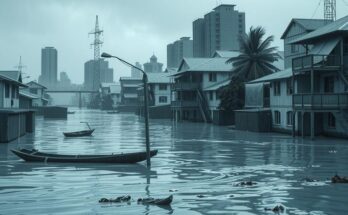Mayotte is under red alert as Cyclone Dikeledi approaches, following the devastation caused by Cyclone Chido. Emergency services are preparing for significant winds and rainfall as Dikeledi is expected to reach the islands by early Sunday. The population is still recovering from the impact of the previous storm, which resulted in numerous casualties and extensive destruction.
The French territory of Mayotte has once again been placed on red alert as Cyclone Dikeledi approaches the islands, which are still reeling from the devastation of Cyclone Chido. Issued by the Prefecture of Mayotte at 10 p.m. local time on Saturday, the red alert warns of the cyclone’s potential impact as it nears the islands after making landfall in northern Madagascar earlier the same day. Emergency services are on high alert, and preparations are underway to ensure the safety of the local population, according to the French Interior Ministry.
Dikeledi is anticipated to reach Mayotte by early Sunday, although meteorologists predict it will likely weaken to a strong tropical storm before landfall. The French meteorological department, Meteo, reported that while the cyclone is expected to pass approximately 75 kilometers south of Mayotte, it will still produce significant winds and rainfall, with wind gusts possibly reaching up to 110 kph.
The islands of Mayotte, which house a population of over 320,000, have yet to recover from Cyclone Chido, which caused extensive destruction just a month prior, resulting in at least 39 fatalities and over 2,000 injuries. Both Chido and its aftermath have been profoundly challenging for Mayotte, the poorest department of France, which struggles with precarious housing conditions exacerbated by the storms. French Prime Minister François Bayrou has stated that the eventual death toll resulting from Cyclone Chido may surpass several hundred.
Cyclone Dikeledi is not expected to match the intensity of Chido; however, it still poses risks of heavy rain and mudslides, as warned by Mayotte Prefect Francois-Xavier Bieuville. The peak cyclone season in the southwestern Indian Ocean stretches from November to April, a period that has been marked by increasingly severe storms in recent years, including Cyclone Idai in 2019, which resulted in over 1,500 casualties across several nations.
The article discusses the ongoing challenges faced by Mayotte, a French territory suffering from the impacts of severe cyclones. The region recently experienced Cyclone Chido, which was the worst storm to hit Mayotte in nearly a century, resulting in considerable loss of life and extensive damage to infrastructure. As cyclone season is currently underway, the approach of another cyclone, Dikeledi, raises concerns about further suffering for an already vulnerable population. Understanding these cyclones and their implications allows readers to grasp the gravity of Mayotte’s situation and the continuing threats posed by extreme weather events.
In summary, Mayotte is preparing for Cyclone Dikeledi as the territory grapples with the aftermath of Cyclone Chido, which inflicted severe damage and loss of life. Authorities are mobilizing to protect the population from potential hazards associated with Dikeledi while acknowledging the region’s precarious situation. The ongoing cyclone season continues to pose significant threats to the safety and well-being of the residents of Mayotte, necessitating vigilance and preparedness from local and national entities.
Original Source: www.usnews.com




